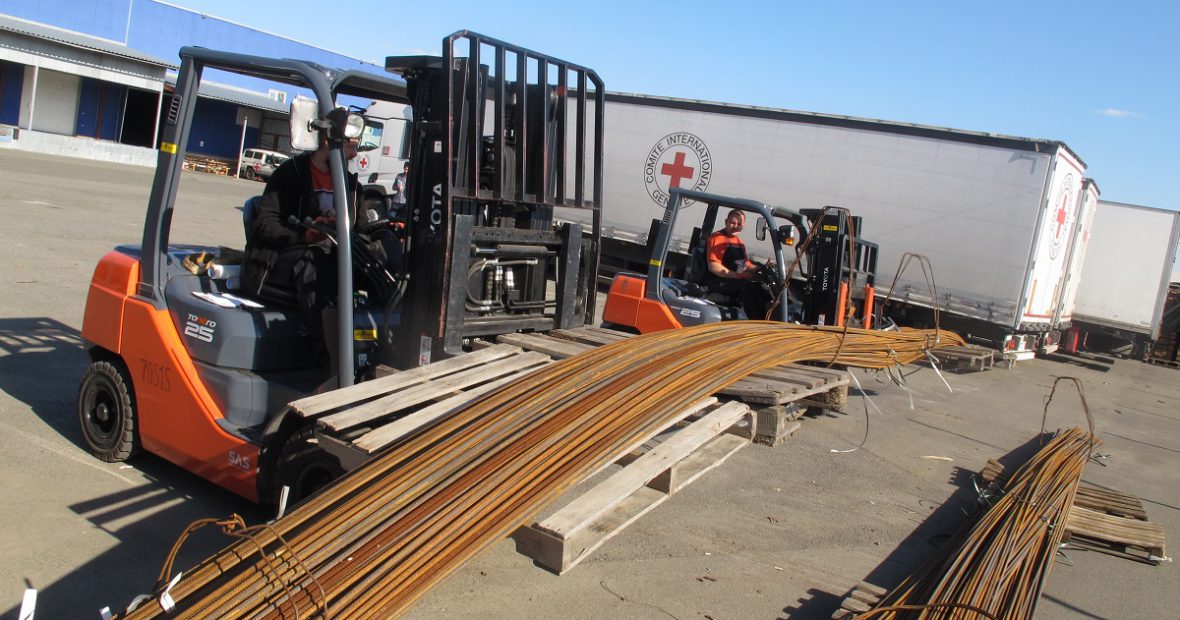What do mattresses, welding machines and jerry cans have in common?
How about timber, insulin and wheelchairs?
Or packs of sugar, water purification tablets and gloves?
They are all part of the humanitarian aid regularly delivered by the ICRC Delegation in Ukraine to the areas affected by the conflict in the east of the country. One might wonder – why timber? why welding machines? why gloves? As a matter of fact, a large chunk of what we deliver in the field are construction goods and various tools necessary to rebuild homes and schools, fix broken water pipelines, and reconnect damaged electricity grids. Access to clean water and power supply are as important for the wellbeing of those living in the conflict zone as are food provisions and medical supplies.
How and where do we acquire such diverse materials?
Most of the material that the ICRC Delegation in Ukraine delivers to our beneficiaries is procured locally, through publicly advertised tenders. Some hard-to-find or very specific items, which may not be available at the domestic market, are purchased in other countries or brought in from the HQ in Geneva. Once acquired, most goods are stored in one of our three warehouses in Kyiv – two “general” and one medical warehouse. There, a detailed verification and quality and quantity control process take place on a regular basis: expiry dates are double-checked, laboratory testing of food and medical items is undertaken, and random sampling is conducted.
But how do we deliver such vast stock to those who need it the most?
Sixteen trucks – fifteen 20-ton trucks and one specialized, five-ton medical reefer truck – are at our disposal. They depart from one of the three warehouses in Kyiv to Donbas on a daily basis. Once there, they sometimes head straight to the destination, for example hospitals and medical centers, which can directly receive medicines, supplies and various life-saving equipment necessary for regular operations. Our warehouse in Donetsk, at 9,833 m³, is by far the largest in our operation, and lorries from Kyiv often deliver their load there first, which is then stocked and distributed further at a later date. Transporting some sensitive materials, for example insulin, needs to be done with extra caution. A special thermometer is installed in the medical truck, as the temperature has to be kept between two and eight degrees Celsius. Both our truck drivers and medical logisticians keep a constant eye on the temperature, and any fluctuation is immediately addressed. No chances are taken.
What is the scope of our operations, and how much aid do we actually deliver, you may wonder next.
In 2017, an average month has seen 65 trucks hit the road carrying around 1,300 tons of goods. These goods have included filtration sand, food parcels (an average weight being 17 kg per parcel), hygienic parcels (1.7 kg), timber, roofing sheets, oriented strand board, bitumen, mechanic tools, nails and screws, anti-blast film, electrodes, gloves, shovels, tire wire, spare tires, washing machines, jerry cans, sewage pumps, impact drills, ladders, agricultural seeds, chicken feed, mine awareness signs, wheelchairs, crutches, mattresses, pillows and blankets, medicine, medical kits, stretchers, body bags, latrines, ICRC publications in Ukrainian, Russian and English … and this is a non-exhaustive list! While it is difficult to provide definite figures, it is safe to say that more than a hundred thousand people in need have benefited from our deliveries this year, be it directly – as immediate recipients, or indirectly – as users of services restarted thanks to ICRC activities (such as school children or hospital patients).
As long as the conflict in eastern Ukraine goes on and the suffering of the local population continues, one thing is certain: the ICRC will carry on delivering humanitarian aid to those who need it the most – be it mattresses, jerry cans or sugar.
Since a picture is worth a thousand words, have a look at the gallery of photos made in three of our warehouses to get a better scope of the size, scope and variety of ICRC Ukraine logistics operations:






















